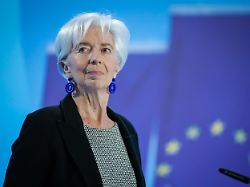Pressure on currency watchdogs continues
Lagarde: ECB must fight “valiantly” against inflation
5/19/2023 9:36 p.m
In an interview with the Spanish television channel TVE, ECB boss Lagarde signals determination. The currency guardians would face difficult decisions. The goal is simple and straightforward: price stability. But the ECB will make the decisions that are necessary for this.
ECB President Christine Lagarde indicates further steps by the monetary authorities in the fight against persistently high inflation. “We are heading towards more delicate decisions in the future, but we will be bold and make the decisions needed to bring inflation back to 2%,” she told Spanish television channel TVE. “And we will, no question,” she added.
Since the interest rate turnaround in July 2022, the European Central Bank (ECB) has raised key interest rates seven times in rapid succession by a total of 3.75 percentage points. The next rate meeting is on June 15 in Frankfurt. According to ECB Director Isabel Schnabel, the central bank has the means to continue to do whatever is necessary, as she said in London. According to a survey, economists expect further small increases of 0.25 percentage points each at the interest rate meetings of the ECB in June and July.
The deposit rate, which is decisive on the financial market and which financial institutions receive from the central bank for parking excess funds, is now 3.25 percent. Inflation in the euro area rose again slightly in April, which means that the ECB is still under pressure to take countermeasures. Consumer prices rose 7.0 percent year-on-year, after 6.9 percent in March and 8.5 percent in February.
This means that inflation is still more than three times as high as the central bank’s target. “We need to continue to have sustained high interest rates, so it’s a time when we really need to buckle up and look at this goal that we have and execute on it,” Lagarde noted. The goal is simple and straightforward: price stability. “And we have to be absolutely determined to achieve that,” she added. The ECB will pursue its goal even if it is a critical moment for the euro zone, when inflation is falling, monetary tightening is starting to take effect and banks are limiting their lending.
Core inflation, which excludes volatile energy prices and the price of unprocessed food, alcohol and tobacco, eased slightly to 5.6 percent in April from 5.7 percent in March. However, there has recently been no sign of a significant decline. The currency guardians had recently kept a close eye on this inflation measure. Because it clearly reflects underlying inflation trends.
Schnabel: The main concern is the persistence of inflation
According to ECB Director Schnabel, the banks in the euro area are resilient. “The ECB can continue to do whatever is necessary to bring inflation back to our 2% target in a timely manner,” said the member of the ECB’s six-strong executive team at an event in the UK capital. This includes raising interest rates to a sufficiently restrictive level and then leaving them there for as long as necessary. Because at the same time, the ECB also has the means to support the financial system of the euro area with liquidity if necessary in order to ensure financial stability and ensure that monetary policy arrives smoothly in the economy.
During a panel discussion after her speech, Schnabel pointed out that persistently high core inflation was a concern. “Our main concern is the persistence of inflation and underlying inflation in particular,” Schnabel said. Wage growth has picked up significantly, and there are concerns about second-round effects. “That’s why it’s so important that we show strong determination to bring inflation back to 2 percent,” she noted. Although inflation expectations are still on track, they are still stubbornly high.
